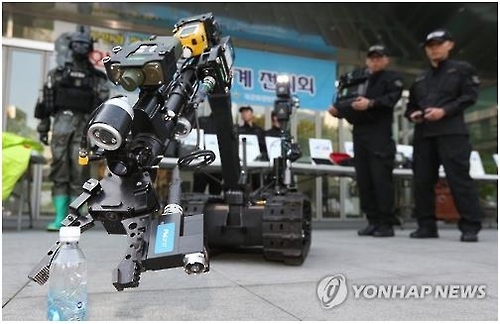S. Korea, US moving to use latest detection gear to counter NK chemical biological threats
By KH디지털2Published : Feb. 26, 2017 - 10:00
South Korea and the United States are moving to employ their latest detection equipment to prepare for North Korean chemical and biological weapons in the joint military drill planned for this year, sources said Sunday.
The move is in response to Pyongyang being accused of using the lethal VX nerve agent to kill Kim Jong-nam, the estranged half brother of North Korean leader Kim Jong-un, at a crowded airport in Malaysia on Feb. 13.

The allies have been conducting the Able Response chemical and biological warfare exercise every year for the past six years. The training drill has been conducted during the Ulchi Freedom Guardian maneuvers.
Officials here said that the use of VX shows that the North is capable of making and employing various chemical and biological weapons.
"Emphasis has been placed on countering VX, sarin, soman and the blister agent lewisite," a military insider said. He said that Seoul thinks the North has a stockpile of artillery shells and missile warheads with chemical and biological agents that can be employed if the need arises. The expert said that such weapons can also be delivered by airplanes.
As part of the effort to bolster readiness, Seoul is in talks with Washington so the US troops can carry out realistic drills using the most advanced detection and decontamination systems.
He added that South Korea's military estimates 30-40 percent of North Korea's Scud B and C missiles are built to deliver chemical weapons. These missiles can reach the South in 4-5 minutes and if they hit populated areas can cause considerable losses of life.
To counter such threats the South Korean military said that it has fielded the K-10 chemical and biological decontamination vehicle and K-CAM2 detectors. The country also has various reconnaissance robots like the Hanuri-T-MIL that can detect chemical and biological agents.
In 2014 Seoul became the fourth country in the world after Canada, the United States and Britain to produce area detection devices that can ferret out dangerous chemicals at key military and civilian facilities.
Despite such preparations, the military said there is a need to further beef up the country's chemical and biological warfare capability.
Starting in 2015, the military has injected 67 billion won
($75.7 million) to upgrade gas masks for troops and build a new armored chemical and biological agent detection armored vehicle that will reach troops by the end of this year. The new vehicle can detect deadly agents several kilometers away. (Yonhap)


















![[Today’s K-pop] Treasure to publish magazine for debut anniversary](http://res.heraldm.com/phpwas/restmb_idxmake.php?idx=642&simg=/content/image/2024/07/26/20240726050551_0.jpg&u=)